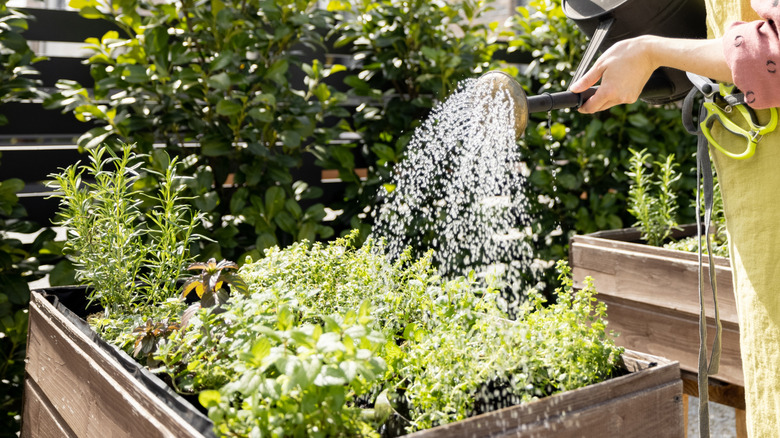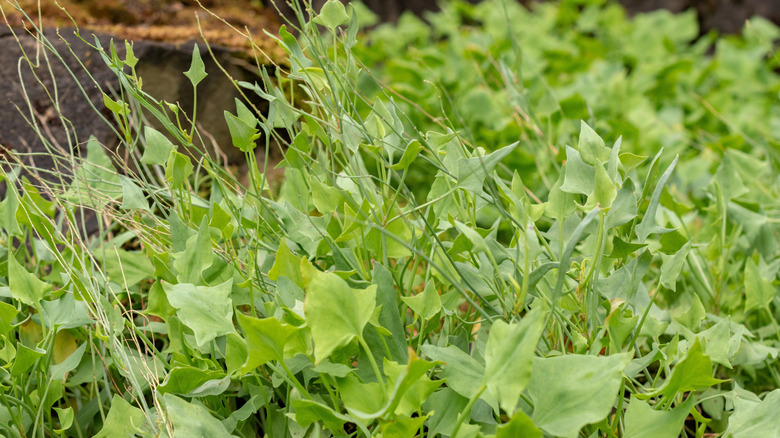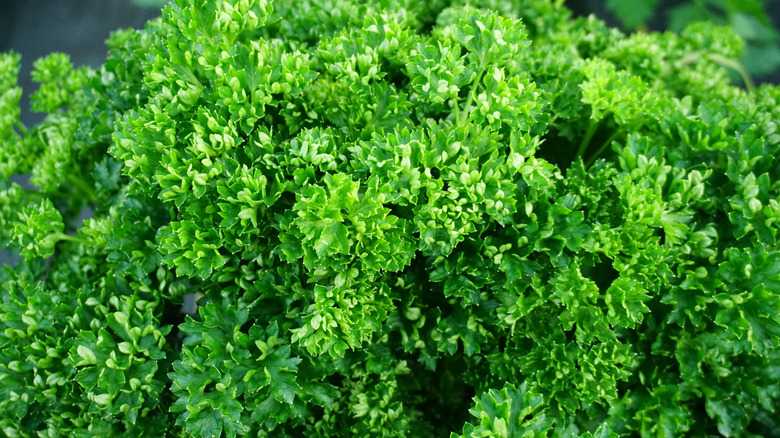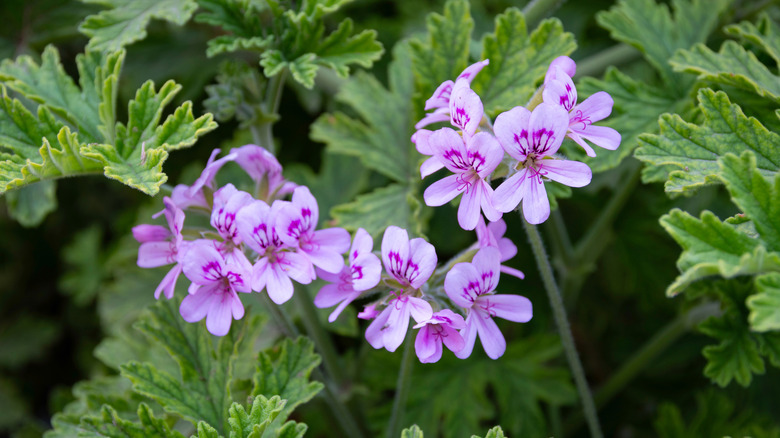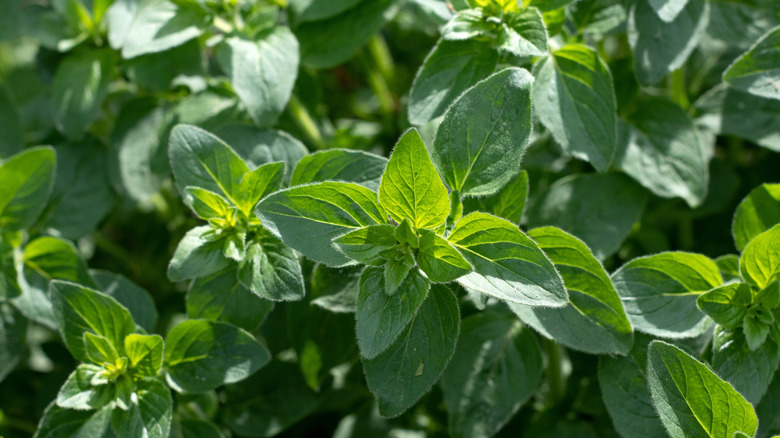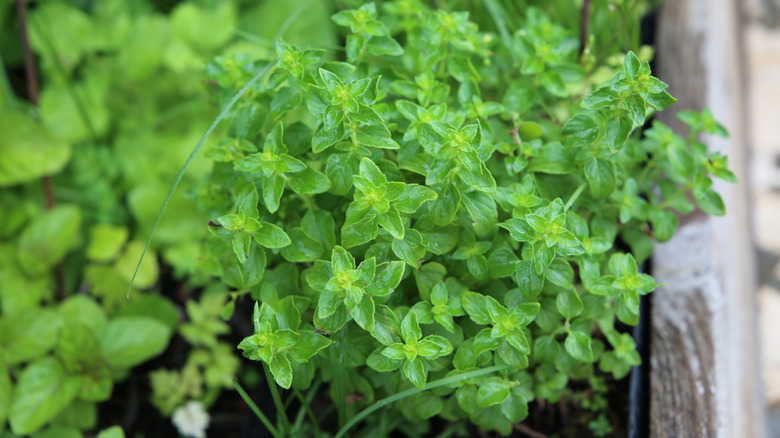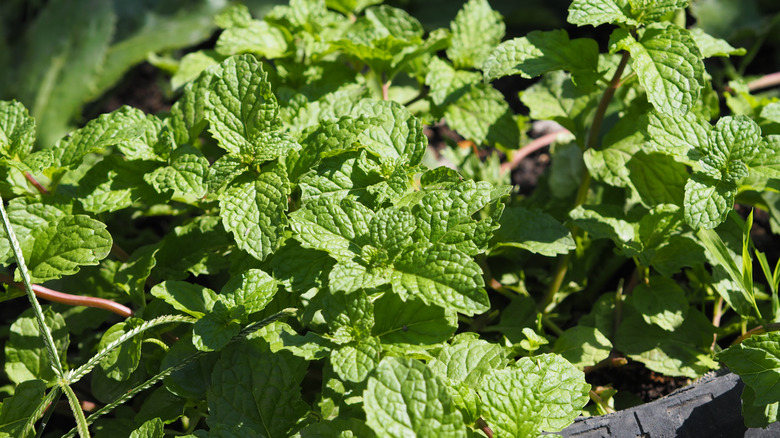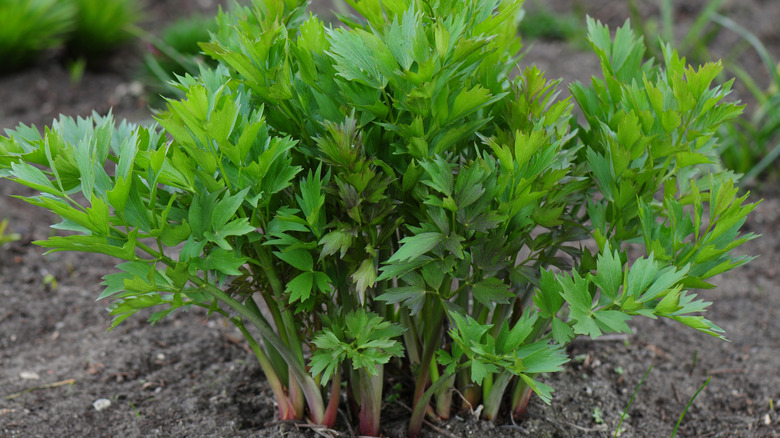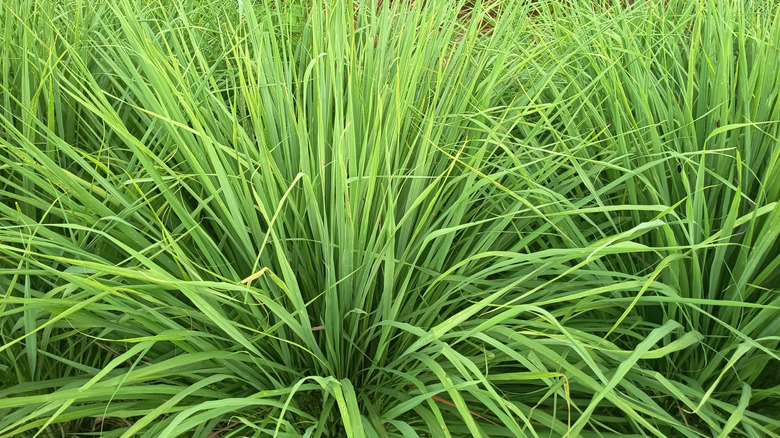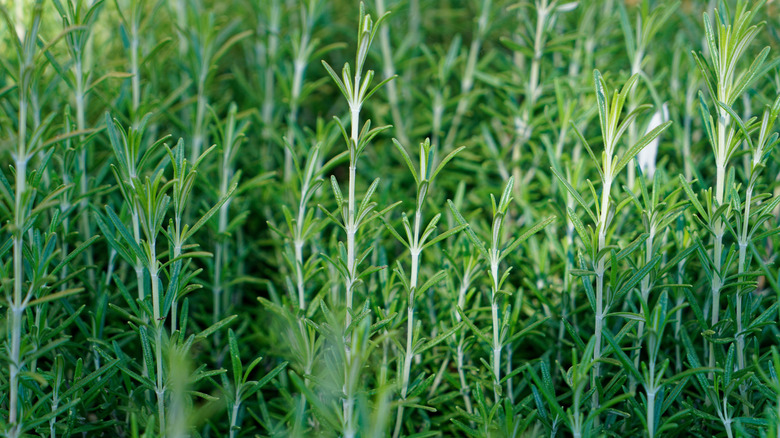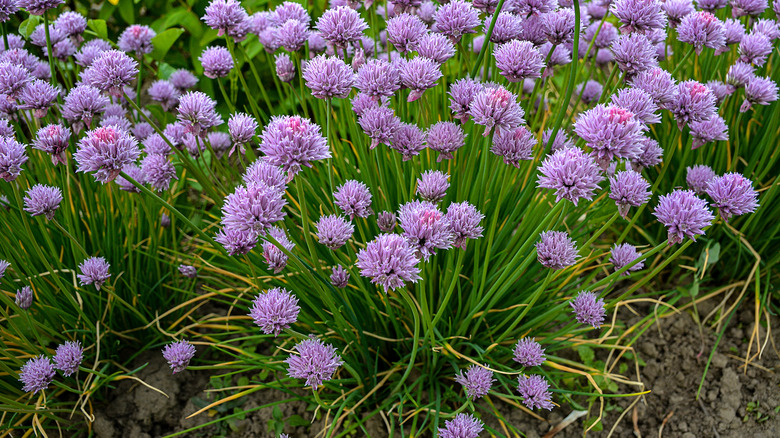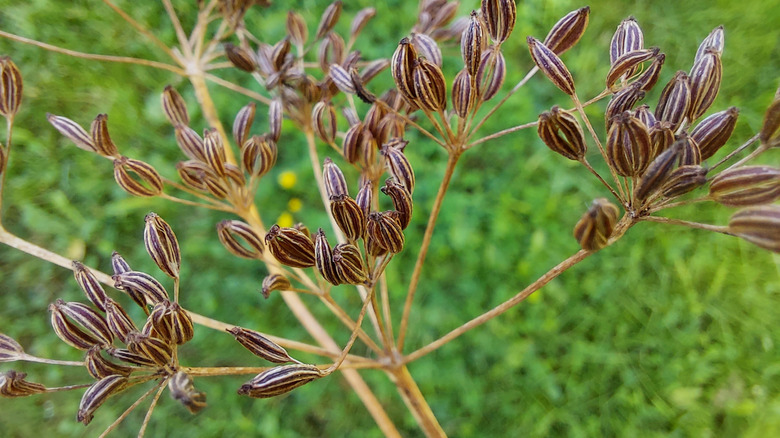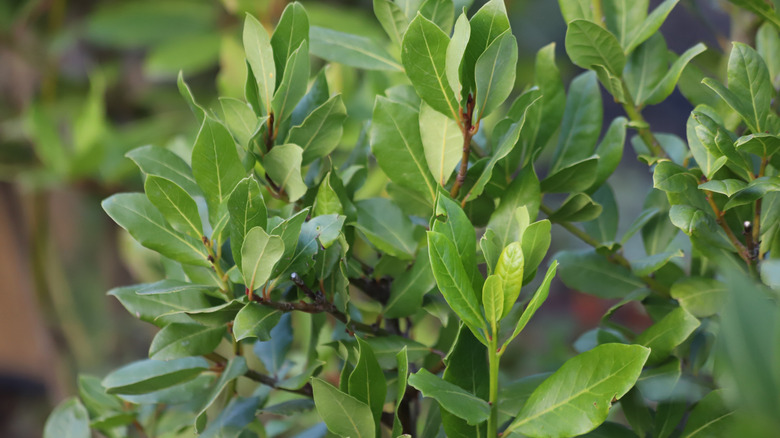12 Popular Herbs You May Want To Avoid Growing In Your Home Or Garden If You Own Pets
When you're keen on cooking up a riot, you might devote much of your time to researching and employing helpful tips for growing a thriving herb garden. And it can be an exciting endeavor because there's a whole world of scents and tastes to explore. For starters, you need to choose the best spot and decide whether you can keep culinary herbs on your kitchen counter or grow aromatic herbs in the garden to ward off pests. However, don't forget to account for a major factor: can these herbs harm your pets? Spoiler alert: A few can, namely parsley, sorrel, chives, tarragon, oregano, marjoram, lemongrass, bay laurel, and more, as you'll discover below.
Knowing how nosy our cats and dogs can be — putting their paws and mouths where they're not welcome — it's essential to learn about herbs that may be toxic to them. While a leaf or two rarely poses a concern, consuming larger quantities can be extremely dangerous, often requiring veterinary attention. Given that, it's best to either remove the herbs altogether if they've just come with the house or cordon off the area and train your pets not to venture any closer to them if you're going ahead with their planting. Made your call? Here's a quick roundup of 12 popular herbs you may want to avoid growing if you keep pets.
Garden sorrel
Known by several names, including French sorrel and narrow-leaved dock, garden sorrel (Rumex scutatus) is a culinary herb that's grown in early spring when most other herbs are yet to begin producing. Even those who don't appreciate its tart, citrusy flavor may grow sorrel regardless because it has a neat, rosette habit that looks nice fronting the borders. However, since the plant contains soluble oxalates, it can be toxic to dogs, cats, and horses. In small amounts, accidental ingestion can cause a stomach upset, while higher doses may cause seizures, heart conditions, or renal injuries.
Curley-leaved parsley
You might be thinking of growing curly-leaved parsley (Petroselinum crispum), as it's an easy-to-grow herb that can attract more butterflies to your garden. However, if you raise cats, dogs, or horses, reconsider your choice. Parsley contains furanocoumarins, which may cause dermatitis or increase the likelihood of sunburn if consumed in large quantities. For this reason, you should also avoid sharing food garnished with parsley with your pets, as it may irritate their skin, leading them to scratch or bite the inflamed area. In rare cases, you may also find their skin developing painful blisters and scabs, requiring medical attention.
Scented geranium
If you love a good fragrance, scented geraniums (Pelargonium spp.) might be your go-to planting option. Offering a broad collection of varieties, they perfume the landscape with hints of mint, lemon, and rose, while the leaves are used to flavor desserts and tea. However, keep this herb away from your pets, especially cats, who are the most vulnerable to the dangers of this plant. Geraniums contain geraniol, which can irritate the eyes on contact and ingestion. They also include linalool, which can cause vomiting, stomach upset, and loss of appetite. If consumed in high quantities, your pets may lose all movement or become depressed.
Greek oregano
When you're looking for true oregano to season pizzas and Mexican salads, you're ideally thinking of Greek oregano (Origanum vulgare subsp. hirtum). Moreover, it has the best flavor of all oregano varieties that deer, pests, and rabbits don't care for, and is hardy to USDA zone 5 with winter protection. However, if your pets are given to chewing whatever catches their fancy, be a bit careful with this herb's location. Although it's only mildly toxic when consumed in greater quantities, it can induce vomiting and diarrhea, which isn't pleasant for your pet or you.
Pot marjoram
Down south, where the stifling heat and drought stress drive most herbs out of business, knotted or pot marjoram (Origanum majorana) has found a way to survive and thrive due to its tolerance. Alongside the leaves, even their pale pink flowers are edible. However, like oregano, marjoram must be consumed in small quantities or avoided altogether for sensitive pets. While it's unclear which chemical is causing problems, pot marjoram has the potential to irritate the digestive system, causing cats and dogs to puke or suffer diarrhea.
Peppermint
Before your mind goes all dreamy, recalling the delicious, heavenly taste of baked winter goodies and candies that use peppermint (Mentha x piperita), there's one important fact to know if you're a pet parent. Peppermint might not be a great addition to your pets' diet, deliberate or otherwise. While a couple of leaves aren't a reason for concern, anything more could upset their stomachs, leading to loose bowel movement or retching. Indeed, if you're the type to squeeze peppermint for essential oils, be on alert that your cats don't consume it, or they'll need immediate medical attention to check liver damage.
Lovage
Those looking to plant herbs once so they'll return to your garden on their own each year may find lovage (Levisticum officinale) an enticing option. They also give the biggest bang for their size, considering their leaves, flowers, and even seeds are edible. But if you keep felines, dogs, or horses, be sure to keep them away from lovage. The essential oils in the herb, phthalide lactones in particular, can make your pets miserable, as they will leave wanting to urinate repeatedly. You should be especially careful if you have collies, English or German shepherds, sheepdogs, or breeds with the MDR-1 mutation.
Lemongrass
Typically used in South Asian cuisine, lemongrass (Cymbopogon citratus) is an ornamental herb you may want to think twice before planting if you have felines or canines for company. Although most pets wouldn't consume lemongrass in large amounts, in case they do, they may suffer from digestive issues because of the essential oils and cyanogenic glycosides present in the leaves. Sometimes these glycosides may change into cyanides after interacting with dog saliva. If you live on a homestead and rear horses, excessive feeding on this herb may lead to weakness and breathing issues, which can be fatal.
French tarragon
French tarragon (Artemisia dracunculus), also known as estragon, dragon plant, or pinon wormwood, is a staple addition to French cooking. But if you're growing this herb, know that it may harm your pets if consumed in excessive amounts. The essential oils present in the herb may instigate a reaction in the digestive system, causing your furry friends to throw up. Sometimes, they may also get diarrhea. Regular consumption can cause liver damage in dogs.
Chives
The Allium family, including chives (Allium schoenoprasum), has been known to be mildly toxic to household pets. While in smaller quantities, chives may at most induce vomiting, nausea, and abdominal pain, things can get serious if more of them are consumed. Chives contain N-propyl disulfide, which can cause the red blood cells (RBCs) to break down, resulting in anemia. Japanese dog breeds, like Shiba Inu, Shikoku, and Akita, are most affected, as are some cats. This may be followed by bloody urination, panting, lethargy, and raised heart rates. Note that these symptoms may not appear until five days after ingestion.
Caraway
Also popularly known as meridian fennel and Persian cumin, caraway (Carum carvi) is a hearty plant perfect for raised planter boxes, as long as you keep its self-sowing tendencies in check. But aside from monitoring their spreading skills, you must also watch your pets, lest they apply their jaws where they shouldn't (read "seeds"). The concentrated presence of limonene and carvone in caraway's essential oils can trigger diarrhea and may cause the furry creatures to puke all over the place. In the worst toxicity cases, cats may experience liver failure, while dogs may wind up with blood-related disorders.
Bay laurel
Resist the temptation to keep bay laurel (Laurus nobilis) as a house plant or a specimen in your herb garden if you have pets. Accidental consumption of the leaves, even in small amounts, can cause gastrointestinal issues, including diarrhea and gagging. That's perhaps to do with the presence of eugenol and essential oils in the herb. When consumed in higher quantities, which is possible given the excellent taste, your furry friends may choke on the leaves because of their substantial size. Or, they could develop sores in their mouth and throat from the sharp leafy edges.
